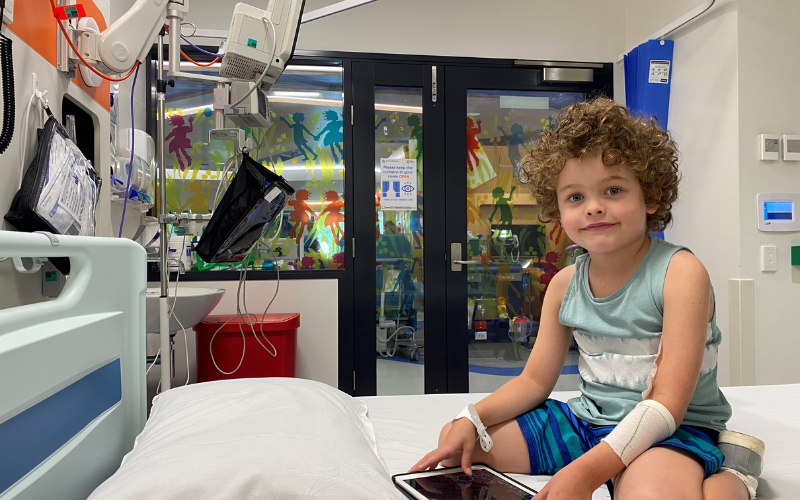
Access to phage therapy, a treatment option for antibiotic resistant superbugs, is now one step closer for people with cystic fibrosis (CF) in WA thanks to a $500,000 donation from Conquer Cystic Fibrosis to the Wal-yan Respiratory Research Centre.
Antimicrobial resistance occurs when bacteria develop ways to resist antimicrobial medicines, such as antibiotics. These resistant bacteria then grow causing very bad and uncontrolled infections.
This is a big problem for people living with CF because they usually take high-dose, long-course antibiotics frequently to fight serious and potentially deadly lung infections.
The last novel antibiotic was discovered in 1987 and there has been a lack in the development of new antibiotics ever since.
Individuals living with CF and their families need alternatives to antibiotics to fight against the harmful bacteria that cause these lung infections – a powerful new weapon is phage therapy.
Phages are specialised viruses that only kill certain bacteria. They can be found everywhere in the environment, including in waterways and soil.
Phage therapy is the treatment of bacterial infections using specific phages. First, the bacteria causing the infection is used to identify which phages can treat it. When matching phages are identified they are cleaned thoroughly so that they can be safely given to humans.
A powerhouse partnership between The Kids Research Institute Australia, Perth Children’s Hospital Foundation and Perth Children’s Hospital, the Wal-yan Respiratory Research Centre is home to the Phage WA team.
The team - led by Director of the Wal-yan Respiratory Research Centre Professor Stephen Stick, who is also a respiratory clinician at Perth Children’s Hospital, and Associate Professor Anthony Kicic, the Head of Airway Epithelial Research at The Kids Research Institute Australia - is leading the WA arm of the Phage Australia Network. This network aims to make phage therapy a reality to treat a variety of bacteria-caused infections, including lung infections in children living with CF.
Associate Professor Kicic said his team is concentrating its efforts on the pipeline to get phage therapy into clinical practice for individuals living with CF, as well as building an Australian-based phage manufacturing capability.
“Our team has spent the past two years creating a library of phage viruses and matching them with the various strains of bacteria that cause serious lung infections, to find the best treatment to destroy the lung infection. Our library is currently in the thousands,” Associate Professor Kicic said.
“Excitingly, ethics approval for the national implementation of compassionate use of phages has been granted, and although a small-scale facility exists in Sydney, it cannot meet the needs of patients here in WA in a practical timeframe.
Therefore, with the help of Conquer Cystic Fibrosis we are establishing a phage bioreactor facility in WA, where phages will be manufactured to treat infections in patients where very limited, or no treatment options, exist.
“This work is only possible through funding from research grants and the generosity of donors such as Conquer Cystic Fibrosis who have supported the critical work needed to make phage therapy a reality for WA in the near future.”
The Phage WA team is implementing a phage therapy and research platform in WA, that will provide access to phages for patients affected by antimicrobial resistance bacteria so that they can be treated quickly and effectively.
Conquer Cystic Fibrosis Director Wendy Endebrock-Brown said a top research priority for the CF community is tackling lung infections which have become resistant to antibiotics.
“When antibiotics stop working, children with CF and their families understandably feel very scared,” Ms Endebrock-Brown said.
The phage therapy research being undertaken by the Wal-yan Centre is urgently needed, and it’s giving families with CF hope.
“Our community has great faith in research and our dream is that this disease will become manageable in the near future. In the 1960s, the life expectancy for a baby born with CF was five but thanks to research, the projection for a baby born today has risen to over 50.
“We are grateful for the advances extending lives into the future but tragically, the median age of death for an Australian with CF is still just 36 years and that is why our community is desperate to accelerate this phage therapy research. We are in a race to save the lives of the 3,500 young Australians living with CF and that is what drives our volunteer-run charity.
“We are mothers, fathers, aunties, friends and selfless volunteers supporting these passionate researchers who have the potential to relieve the immense burden of this disease.”
Pictured is seven-year-old Connor Barrett. Connor is a Bunbury boy and the youngest of three boys in his family. He is a happy and clever child who dreams of one day becoming a medical scientist to help other children like himself. Connor was diagnosed with CF at three weeks of age through the heel prick test and now takes 25 doses of medicine daily and has twice-daily chest physiotherapy to help him breathe better and reduce the damage to his lungs and digestive system caused by this disease.
Connor’s mum Taryn is a Conquer Cystic Fibrosis committee member. She is grateful that the medical research is extending Connor’s life today and hopes with further breakthroughs, he may get the chance to grow old. Last year Connor spent two weeks in hospital on IV antibiotics to treat pseudomonas and staph aureus - which are two bacterial infections phage therapy may be able to tackle in coming years. The more often Connor acquires these infections the more likely he is to develop a resistance and become colonised with them. This can result in increased hospitalisations and scarring to the lungs which will ultimately reduce his life expectancy.
Thankyou @ConquerCF for your support of this important #phagetherapy research, as covered on @9NewsPerth by @_KelHaywood. Find out more about phage therapy as a treatment option for #antibioticresistant #superbugs 👉https://t.co/GnHA2rIP0C@telethonkids @PCHFWA @PerthChildrens https://t.co/iW2rkeNEp4
— Wal-yan Respiratory Research Centre (@WalyanCentre) February 8, 2023
